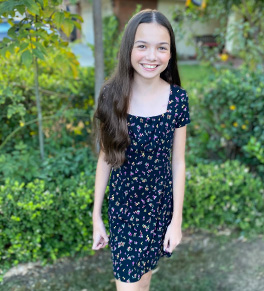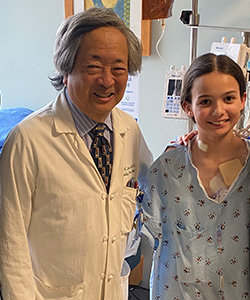Young dancer triumphs over rare pancreatic tumor

In November 2023, 11-year-old Lauren Torres’ life took an unexpected turn. What began with her annual physical would lead to a rare diagnosis and major surgery.
During the checkup, the Corona family’s longtime nurse practitioner felt an unusual mass while palpitating Lauren’s abdomen and immediately referred her to Children’s Hospital of Orange (CHOC) for tests. There, a CT scan revealed a mass on her pancreas.
To biopsy the abnormal growth, the CHOC doctors referred the family to the UCI Health Chao Digestive Health Institute and interventional gastroenterologist Dr. John G. Lee, co-director of the institute and an expert in the diagnosis and treatment of pancreatic disorders.
Lee consulted with UCI Health surgeon Dr. David K. Imagawa, who suspected a rare pancreatic tumor. An endoscopic ultrasound showed the mass in the head of Lauren’s pancreas and a fine needle aspiration biopsy was performed to determine the type of tumor. It confirmed that the mass was a solid pseudopapillary neoplasm of the pancreas (SPN). This type of tumor accounts for 2% to 3% of all pancreatic tumors and is even more rare in children.
Diagnosis complete, a path emerges
“She has a tumor” are words Vicki and Sean Torres never thought they’d hear in connection with their happy, energetic daughter. A gifted dancer and gymnast, Lauren hadn’t complained about feeling any abdominal distress.
“Lauren has always been thin and petite,” says Vicki Torres. “I don’t know if the tumor would’ve been found if not for that — and the vigilance of our nurse practitioner.”
SPN is generally a slow-growing pancreatic tumor seen mostly in young women in their 20s or 30s. Frequently described as a low-grade malignancy, they usually don’t recur once they have been surgically removed.
Imagawa worried that the tumor was pushing against Lauren’s portal vein, the liver’s main blood supply, increasing the risk for the already complicated Whipple surgery she would need. He conferred with a CHOC medical oncologist and together they recommended a clinical trial to reduce the tumor’s size.
“For someone like Lauren who is so small, I wanted to err on the side of shrinking the tumor if we could,” Imagawa says.
A turn for the worse
But after three rounds of treatment, the mass had grown larger. On March 5, she was admitted for Whipple surgery, which is almost never performed on children.
Because the pancreas is located deep in the abdomen and is surrounded by many blood vessels, a Whipple procedure requires a high level of skill and experience. Imagawa, one of the top U.S. liver and pancreas surgeons, has performed more than 1,000 of them.
The procedure involves removing the head of the pancreas, the first part of the small intestine called the duodenum, as well as the gallbladder and bile duct. The remaining organs are rejoined to allow food to move through the digestive tract.
However, just minutes into the complex surgery, Lauren developed a sudden drop in blood pressure, a rapid heart rate, a high concentration of acids in her blood and an alarming spike in body temperature.
Dr. Govind Rajan suspected malignant hyperthermia, a rare, life-threatening allergic reaction to anesthesia. The anesthesiologist, who had seen only one case in his 30-year career, immediately sprang into action, pausing the surgery to confirm his initial diagnosis.
“As an academic medical system, we train annually for severe contingencies like this and we have a malignant anesthesia response cart at the ready,” says Rajan.
Lauren responded well to an antidote and after discussions with the surgeon and the Torres family, Rajan gave the green light to proceed.
“We were nervous, but I always felt there was a plan and if that didn’t work, a plan B and a plan C,” Sean Torres says. “We were in good hands and that was very comforting.”
After successfully removing a baseball-sized tumor from Lauren’s pancreas and reconnecting her digestive tract, Imagawa emerged from the eight-hour surgery to give the family the good news. Their relief was palpable.
“It was a surgical miracle that we were able to treat Lauren for malignant hyperthermia while she had her tumor resected,” says Rajan. “We monitored her very closely throughout surgery and for several days after. There were no repercussions to her health.”
Rest and recovery
The first few days in the surgical intensive care unit were nerve wracking for her parents. Lauren was sleeping a lot and wasn’t very responsive because of pain medications. That is until one of the pet therapy volunteers stopped by with his dog Lulu.
“I heard my parents telling someone I was asleep and to maybe come back later,” Lauren recalls. “I wasn’t sure who it was, but I opened my eyes and saw Lulu. She was so cute! I remember feeling excited and happy!”
Lauren asked if the black-and-white Mi-Ki dog could sit on her bed, Vicki Torres recalls. “Then she just started talking away!”
Imagawa checked on Lauren daily, even on weekends during her 12-day hospital stay, to make sure she was doing well.
“For a child who has been healthy her entire life, Lauren had the best attitude and a quiet strength,” marvels Imagawa. “She never complained. If we told her she needed to do something to get better, she did it. If we asked her to walk two times around the nurse’s station, she walked four. Her determination is just incredible.”
At home in Corona, Lauren continued to recover rapidly. Her appetite and weight soon returned to normal.
In April, she was back at her dance studio, observing classes. By June, her energy fully restored, she was performing in recitals.
A healthy future ahead
“Lauren is a loving, fun, smart and active girl,” Vicki Torres says of her now 12-year-old daughter. “Nothing has affected her energy and positivity.”
Because Imagawa was able to leave the tail of the pancreas, where insulin is secreted, Lauren is not at risk for developing diabetes. She will need regular lab tests for the rest of her life, but the chance of SPN recurring is very small.
Throughout Lauren’s hospital stay, she was grateful for all her caregivers. But Annie Reyes was so exceptional that she nominated the nurse for the academic health system's prestigious DAISY award.
“The care she got at UCI Health, from her surgery to her rehab and everything in between, was nothing short of amazing” says Vicki Torres. “We are forever grateful!”
Related stories
- Islet cell transplant frees young woman from debilitating pancreatitis
- Pancreatic cancer discovered during pregnancy ›
- David K. Imagawa receives lifetime achievement award ›






